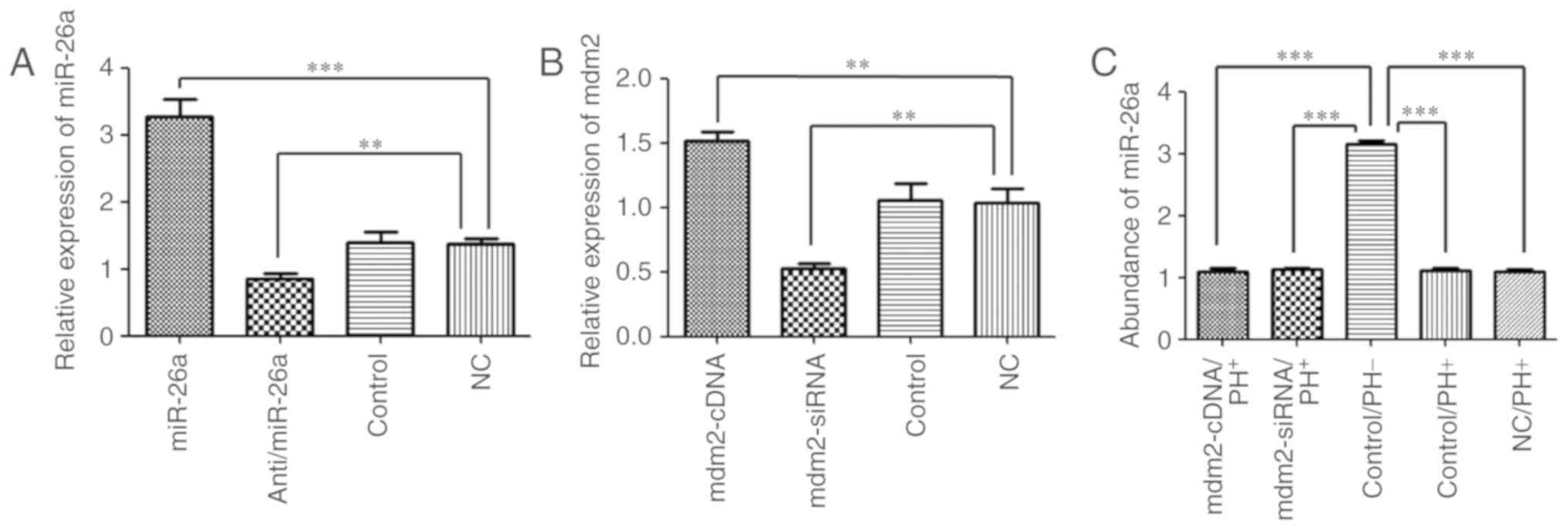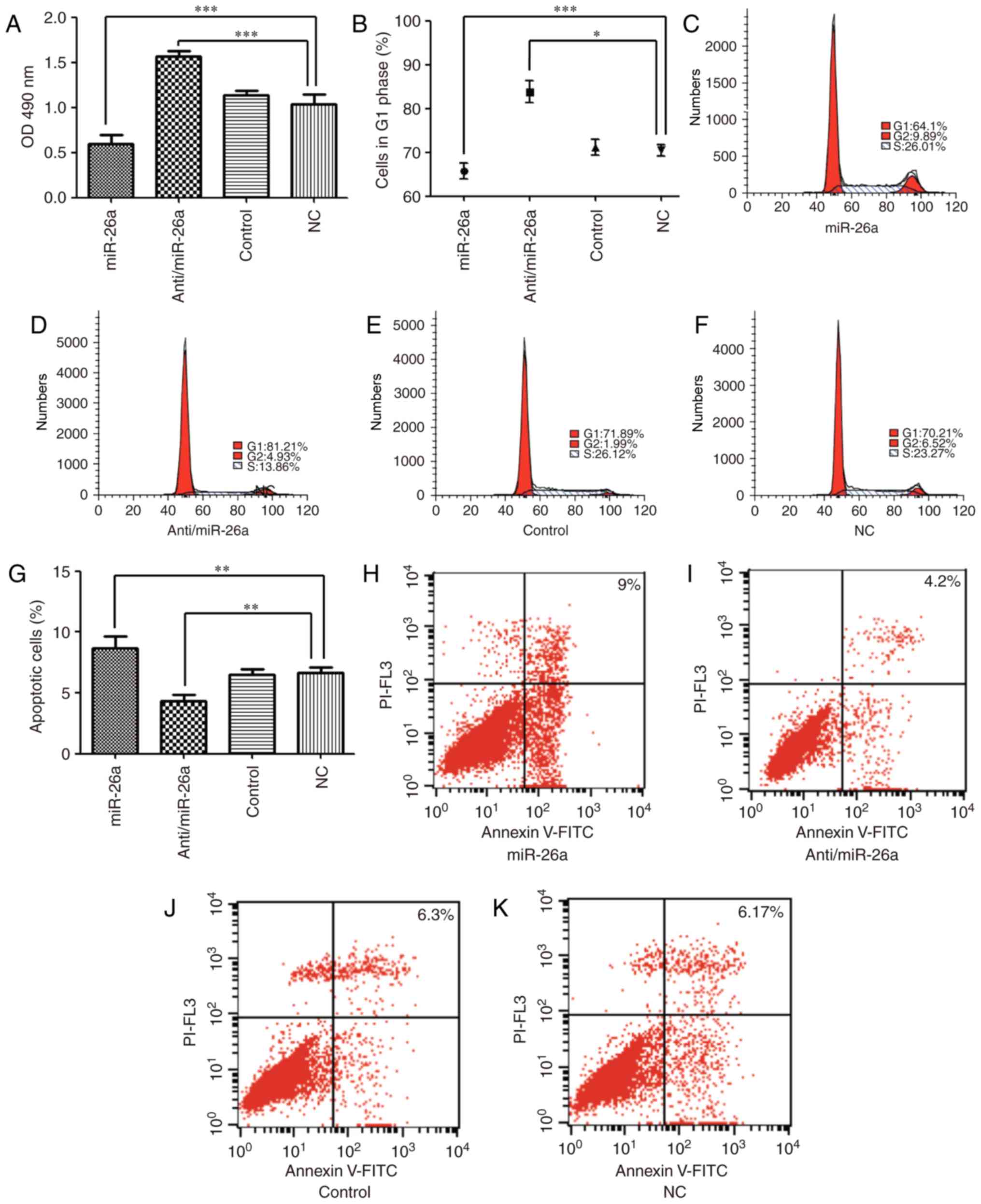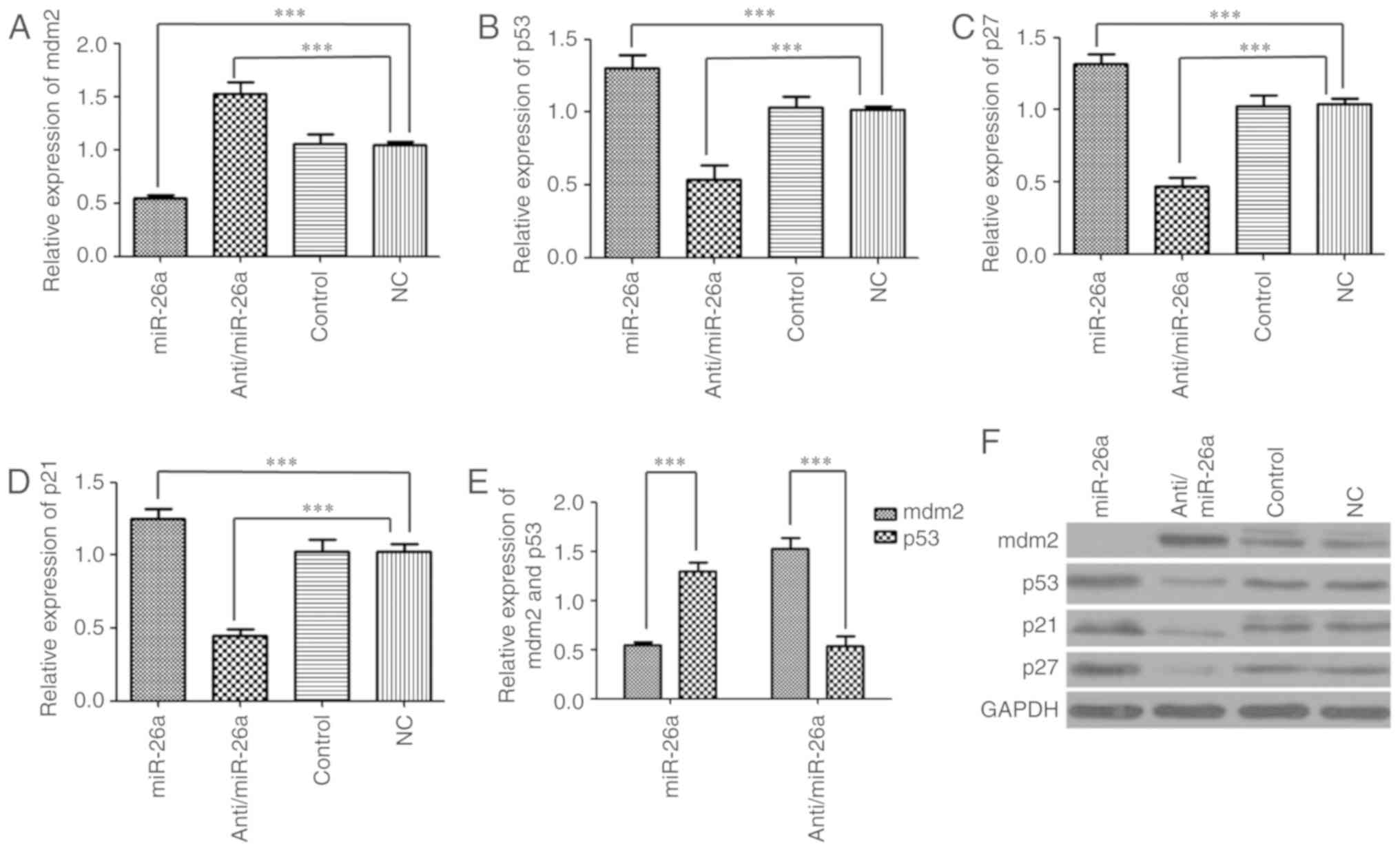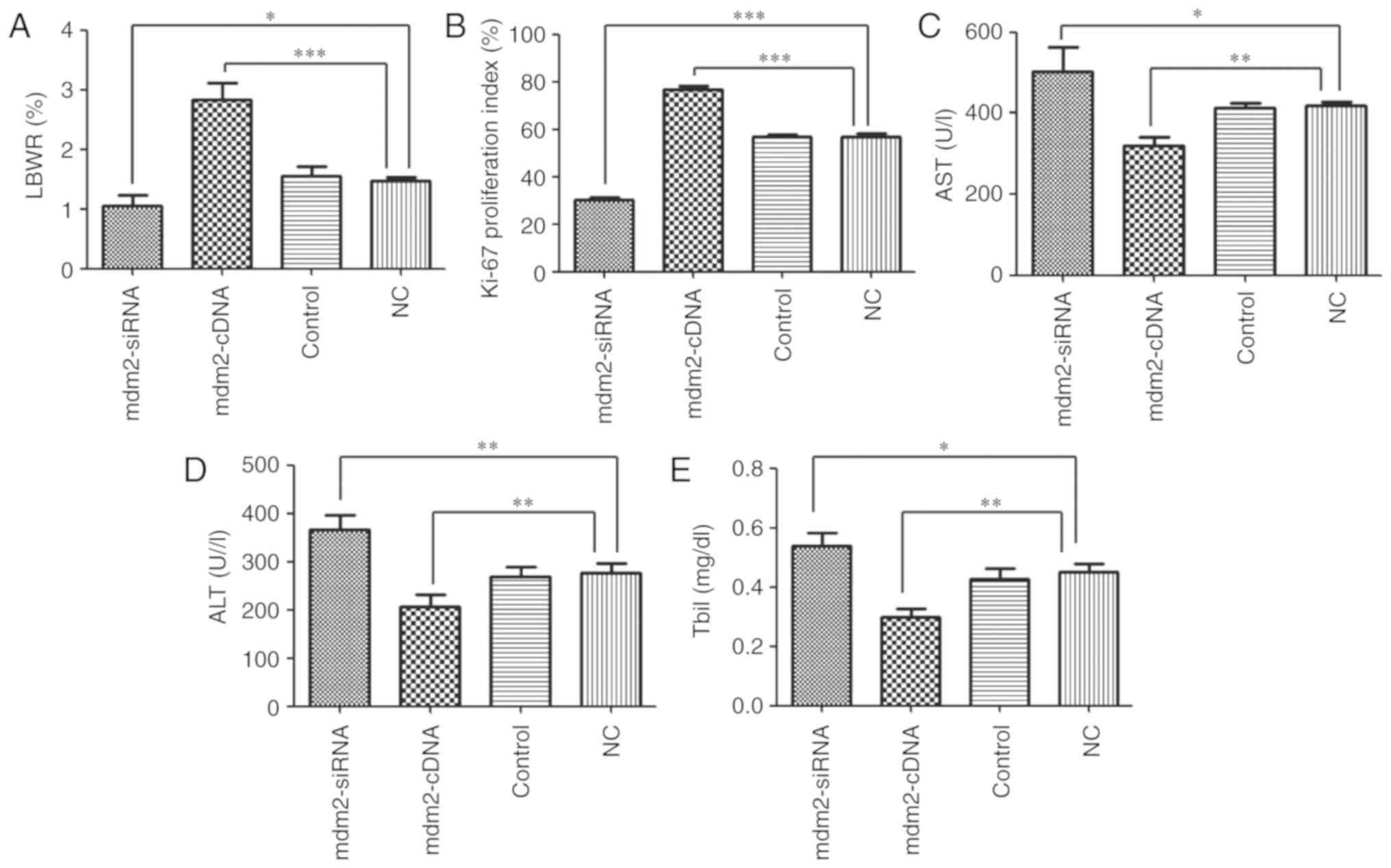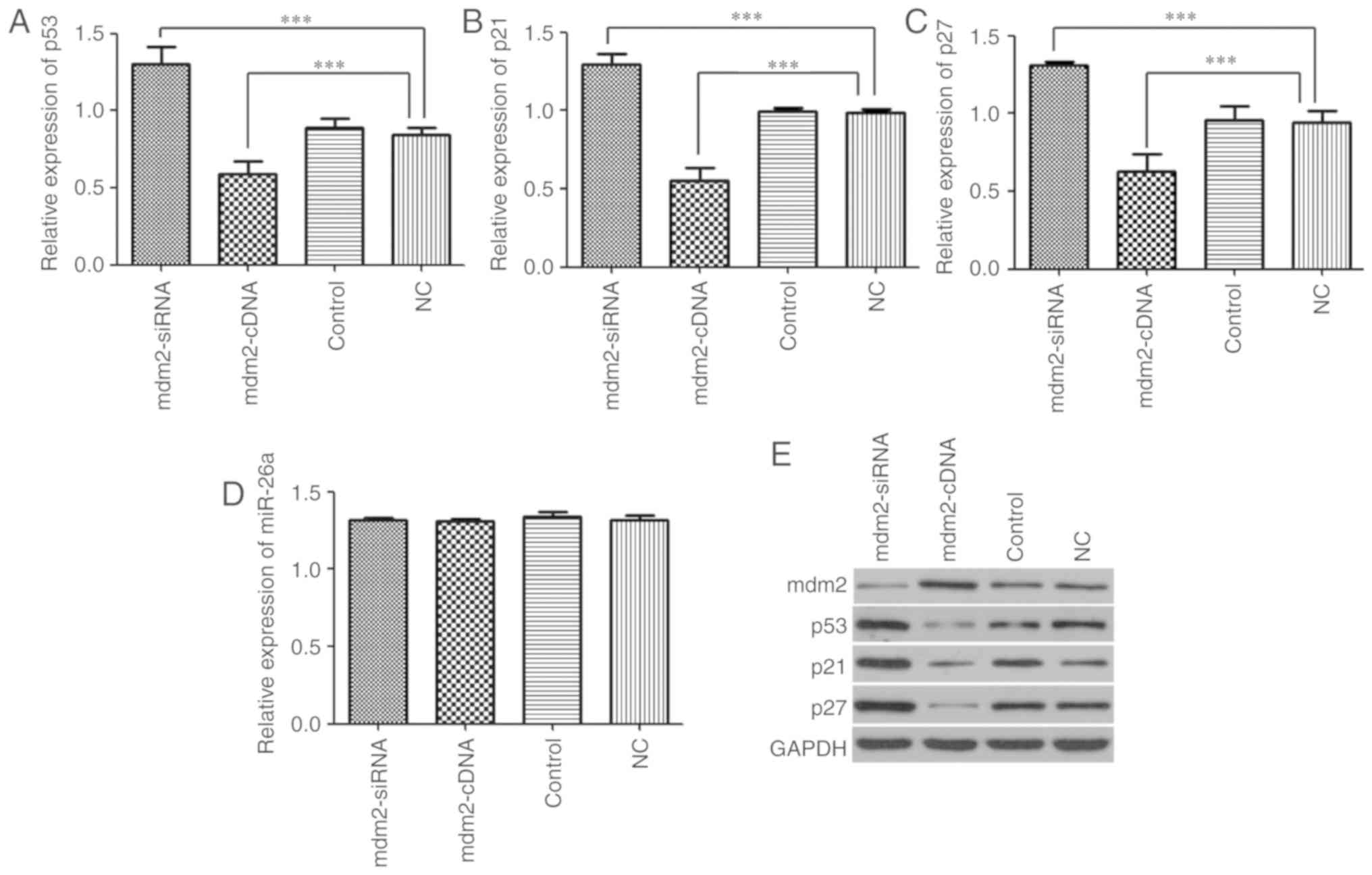|
1
|
Port JD and Sucharov C: Role of microRNAs
in cardiovascular disease: Therapeutic challenges and potentials. J
Cardiovasc Pharmacol. 56:444–453. 2010. View Article : Google Scholar : PubMed/NCBI
|
|
2
|
Lynn FC: Meta-regulation: MicroRNA
regulation of glucose and lipid metabolism. Trends Endocrinol
Metab. 20:452–459. 2009. View Article : Google Scholar : PubMed/NCBI
|
|
3
|
Pager CT, Wehner KA, Fuchs G and Sarnow P:
MicroRNA-mediated gene silencing. Prog Mol Biol Transl Sci.
90:187–210. 2009. View Article : Google Scholar : PubMed/NCBI
|
|
4
|
Hammond SM: MicroRNA therapeutics: A new
niche for antisense nucleic acids. Trends Mol Med. 12:99–101. 2006.
View Article : Google Scholar : PubMed/NCBI
|
|
5
|
He L and Hannon GJ: MicroRNAs: Small RNAs
with a big role in gene regulation. Nat Rev Genet. 5:522–531. 2004.
View Article : Google Scholar : PubMed/NCBI
|
|
6
|
Zhou J, Ju QW, Yuan XP, Zhu XF, Wang DP
and He XS: miR-26a regulates mouse hepatocyte proliferation via
directly targeting their 3′untranslated region of CCND2 and CCNE2.
Hepatobiliary Pancreat Dis Int. 15:65–72. 2016. View Article : Google Scholar : PubMed/NCBI
|
|
7
|
Zhou J, Ju W, Wang D, Wu L, Zhu X, Guo Z
and He X: Down-regulation of microRNA-26a promotes mouse hepatocyte
proliferation during liver regeneration. PLoS One. 7:e335772012.
View Article : Google Scholar : PubMed/NCBI
|
|
8
|
Momand J, Zambetti GP, Olson DC, George D
and Levine AJ: The mdm-2 oncogene product forms a complex with the
p53 protein and inhibits p53-mediated transactivation. Cell.
69:1237–1245. 1992. View Article : Google Scholar : PubMed/NCBI
|
|
9
|
Haupt Y, Maya R, Kazaz A and Oren M: Mdm2
promotes the rapid degradation of p53. Nature. 387:296–299. 1997.
View Article : Google Scholar : PubMed/NCBI
|
|
10
|
Eischen CM and Lozano G: p53 and MDM2:
Antagonists or partners in crime? Cancer Cell. 15:161–162. 2009.
View Article : Google Scholar : PubMed/NCBI
|
|
11
|
Barak Y, Juven T, Haffner R and Oren M:
Mdm2 expression is induced by wild-type p53 activity. EMBO J.
12:461–468. 1993. View Article : Google Scholar : PubMed/NCBI
|
|
12
|
Harris SL and Levine AJ: The p53 pathway:
Positive and negative feedback loops. Oncogene. 24:2899–2908. 2005.
View Article : Google Scholar : PubMed/NCBI
|
|
13
|
Cao LQ, Wang YN, Liang M and Pan MZ: CALB1
enhances the interaction between p53 and MDM2, and inhibits the
senescence of ovarian cancer cells. Mol Med Rep. 19:5097–5104.
2019.PubMed/NCBI
|
|
14
|
Xu X, Liu Q, Zhang C, Ren S, Xu L, Zhao Z,
Dou H, Li P, Zhang X, Gong Y and Shao C: Inhibition of DYRK1A-EGFR
axis by p53-MDM2 cascade mediates the induction of cellular
senescence. Cell Death Dis. 10:2822019. View Article : Google Scholar : PubMed/NCBI
|
|
15
|
Wurz RP and Cee VJ: Targeted degradation
of MDM2 as a new approach to improve the efficacy of MDM2-p53
inhibitors. J Med Chem. 62:445–447. 2019. View Article : Google Scholar
|
|
16
|
Shunchang S, Haitao C, Weidong C, Jingbo H
and Yunsheng P: Expression of truncated dystrophin cDNAs mediated
by a lentiviral vector. Neurol India. 56:52–56. 2008. View Article : Google Scholar : PubMed/NCBI
|
|
17
|
Guo J, Li M, Meng X, Sui J, Dou L, Tang W,
Huang X, Man Y, Wang S and Li J: miR-291b-3p induces apoptosis in
liver cell line NCTC1469 by reducing the level of RNA-binding
protein HuR. Cell Physiol Biochem. 33:810–822. 2014. View Article : Google Scholar : PubMed/NCBI
|
|
18
|
Mitchell C and Willenbring H: A
reproducible and well-tolerated method for 2/3 partial hepatectomy
in mice. Nat Protoc. 3:1167–1170. 2008. View Article : Google Scholar : PubMed/NCBI
|
|
19
|
Bockhorn M, Goralski M, Prokofiev D,
Dammann P, Grünewald P, Trippler M, Biglarnia A, Kamler M, Niehues
EM, Frilling A, et al: VEGF is important for early liver
regeneration after partial hepatectomy. J Surg Res. 138:291–299.
2007. View Article : Google Scholar : PubMed/NCBI
|
|
20
|
Livak KJ and Schmittgen TD: Analysis of
relative gene expression data using real-time quantitative PCR and
the 2(-Delta Delta C(T)) method. Methods. 25:402–408. 2001.
View Article : Google Scholar
|
|
21
|
Grimson A, Farh KK, Johnston WK,
Garrett-Engele P, Lim LP and Bartel DP: MicroRNA targeting
specificity in mammals: Determinants beyond seed pairing. Mol Cell.
27:91–105. 2007. View Article : Google Scholar : PubMed/NCBI
|
|
22
|
Betel D, Wilson M, Gabow A, Marks DS and
Sander C: The microRNA.org resource: Targets and expression.
Nucleic Acids Res. 36(Database issue): D149–D153. 2008. View Article : Google Scholar :
|
|
23
|
Krek A, Grün D, Poy MN, Wolf R, Rosenberg
L, Epstein EJ, MacMenamin P, da Piedade I, Gunsalus KC, Stoffel M
and Rajewsky N: Combinatorial microRNA target predictions. Nat
Genet. 37:495–500. 2005. View
Article : Google Scholar : PubMed/NCBI
|
|
24
|
Zhang J, Sun Q, Zhang Z, Ge S, Han ZG and
Chen WT: Loss of microRNA-143/145 disturbs cellular growth and
apoptosis of human epithelial cancers by impairing the MDM2-p53
feedback loop. Oncogene. 32:61–69. 2013. View Article : Google Scholar
|
|
25
|
Suh SS, Yoo JY, Nuovo GJ, Jeon YJ, Kim S,
Lee TJ, Kim T, Bakàcs A, Alder H, Kaur B, et al: MicroRNAs/TP53
feedback circuitry in glioblastoma multiforme. Proc Natl Acad Sci
USA. 109:5316–5321. 2012. View Article : Google Scholar : PubMed/NCBI
|
|
26
|
Xiao J, Lin H, Luo X and Wang Z: miR-605
joins p53 network to form a p53:miR-605:Mdm2 positive feedback loop
in response to stress. EMBO J. 30:524–532. 2011. View Article : Google Scholar : PubMed/NCBI
|
|
27
|
Cahilly-Snyder L, Yang-Feng T, Francke U
and George DL: Molecular analysis and chromosomal mapping of
amplified genes isolated from a transformed mouse 3T3 cell line.
Somat Cell Mol Genet. 13:235–244. 1987. View Article : Google Scholar : PubMed/NCBI
|
|
28
|
Chen J, Wu X, Lin J and Levine AJ: Mdm-2
inhibits the G1 arrest and apoptosis functions of the p53 tumor
suppressor protein. Mol Cell Biol. 16:2445–2452. 1996. View Article : Google Scholar : PubMed/NCBI
|
|
29
|
Brown DR, Thomas CA and Deb SP: The human
onco-protein MDM2 arrests the cell cycle: Elimination of its
cell-cycle-inhibitory function induces tumorigenesis. EMBO J.
17:2513–2525. 1998. View Article : Google Scholar : PubMed/NCBI
|
|
30
|
Dang J, Kuo ML, Eischen CM, Stepanova L,
Sherr CJ and Roussel MF: The RING domain of Mdm2 can inhibit cell
proliferation. Cancer Res. 62:1222–1230. 2002.PubMed/NCBI
|
|
31
|
Wade M, Wang YV and Wahl GM: The p53
orchestra: Mdm2 and Mdmx set the tone. Trends Cell Biol.
20:299–309. 2010. View Article : Google Scholar : PubMed/NCBI
|
|
32
|
Kruse JP and Gu W: Modes of p53
regulation. Cell. 137:609–622. 2009. View Article : Google Scholar : PubMed/NCBI
|
|
33
|
Juven T, Barak Y, Zauberman A, George DL
and Oren M: Wild-type p53 can mediate sequence-specific
transactivation of an internal promoter within the mdm2 gene.
Oncogene. 8:3411–3416. 1993.PubMed/NCBI
|
|
34
|
Wu X, Bayle JH, Olson D and Levine AJ: The
p53-mdm-2 auto-regulatory feedback loop. Genes Dev. 7:1126–1132.
1993. View Article : Google Scholar : PubMed/NCBI
|
|
35
|
Phillips A, Teunisse A, Lam S, Lodder K,
Darley M, Emaduddin M, Wolf A, Richter J, de Lange J, Verlaan-de
Vries M, et al: HDMX-L is expressed from a functional
p53-responsive promoter in the first intron of the HDMX gene and
participates in an autoregulatory feedback loop to control p53
activity. J Biol Chem. 285:29111–29127. 2010. View Article : Google Scholar : PubMed/NCBI
|
|
36
|
Oliner JD, Pietenpol JA, Thiagalingam S,
Gyuris J, Kinzler KW and Vogelstein B: Oncoprotein MDM2 conceals
the activation domain of tumour suppressor p53. Nature.
362:857–860. 1993. View Article : Google Scholar : PubMed/NCBI
|
|
37
|
Chen J, Lin J and Levine AJ: Regulation of
transcription functions of the p53 tumor suppressor by the mdm-2
oncogene. Mol Med. 1:142–152. 1995. View Article : Google Scholar : PubMed/NCBI
|
|
38
|
Vousden KH and Lu X: Live or let die: The
cell's response to p53. Nat Rev Cancer. 2:594–604. 2002. View Article : Google Scholar : PubMed/NCBI
|
|
39
|
Vousden KH and Ryan KM: p53 and
metabolism. Nat Rev Cancer. 9:691–700. 2009. View Article : Google Scholar : PubMed/NCBI
|
|
40
|
Lane DP: Cancer. p53, guardian of the
genome. Nature. 358:15–16. 1992. View Article : Google Scholar : PubMed/NCBI
|
|
41
|
Soussi T and Béroud C: Assessing TP53
status in human tumours to evaluate clinical outcome. Nat Rev
Cancer. 1:233–240. 2001. View Article : Google Scholar
|
|
42
|
Hollstein M, Sidransky D, Vogelstein B and
Harris CC: p53 mutations in human cancers. Science. 253:49–53.
1991. View Article : Google Scholar : PubMed/NCBI
|
|
43
|
Deng J, Yang M, Jiang R, An N, Wang X and
Liu B: Long non-coding RNA HOTAIR regulates the proliferation,
self-renewal capacity, tumor formation and migration of the cancer
stem-like cell (CSC) subpopulation enriched from breast cancer
cells. PLoS One. 12:e01708602017. View Article : Google Scholar : PubMed/NCBI
|
|
44
|
Nakae J, Kitamura T, Kitamura Y, Biggs WH
III, Arden KC and Accili D: The forkhead transcription factor Foxo1
regulates adipocyte differentiation. Dev Cell. 4:119–129. 2003.
View Article : Google Scholar : PubMed/NCBI
|
|
45
|
Dijkers PF, Medema RH, Pals C, Banerji L,
Thomas NS, Lam EW, Burgering BM, Raaijmakers JA, Lammers JW,
Koenderman L and Coffer PJ: Forkhead transcription factor FKHR-L1
modulates cytokine-dependent transcriptional regulation of
p27(KIP1). Mol Cell Biol. 20:9138–9148. 2000. View Article : Google Scholar : PubMed/NCBI
|
|
46
|
Ezhilarasan D, Evraerts J, Sid B, Calderon
PB, Karthikeyan S, Sokal E and Najimi M: Silibinin induces hepatic
stellate cell cycle arrest via enhancingp53/p27 and inhibiting Akt
downstream signaling protein expression. Hepatobiliary Pancreat Dis
Int. 16:80–87. 2017. View Article : Google Scholar : PubMed/NCBI
|
|
47
|
Gartel AL and Radhakrishnan SK: Lost in
transcription: p21 repression, mechanisms, and consequences. Cancer
Res. 65:3980–3985. 2005. View Article : Google Scholar : PubMed/NCBI
|
|
48
|
Hofseth LJ, Hussain SP and Harris CC: p53:
25 years after its discovery. Trends Pharmacol Sci. 25:177–181.
2004. View Article : Google Scholar : PubMed/NCBI
|
|
49
|
Saile B, Matthes N, El Armouche H,
Neubauer K and Ramadori G: The bcl, NFkappaB and p53/p21WAF1
systems are involved in spontaneous apoptosis and in the
anti-apoptotic effect of TGF-beta or TNF-alpha on activated hepatic
stellate cells. Eur J Cell Biol. 80:554–561. 2001. View Article : Google Scholar : PubMed/NCBI
|















